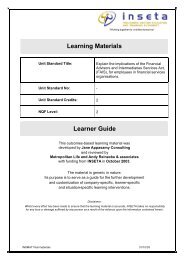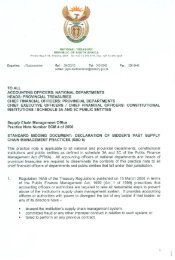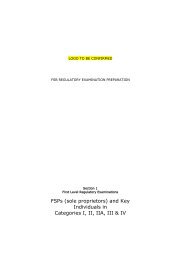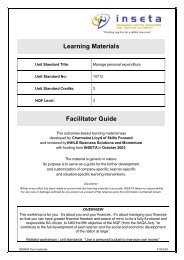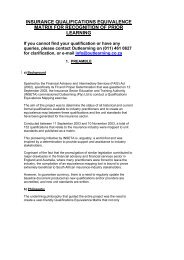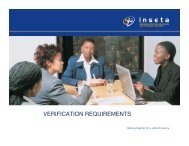SSP Brochure:Layout 1 - INSETA
SSP Brochure:Layout 1 - INSETA
SSP Brochure:Layout 1 - INSETA
You also want an ePaper? Increase the reach of your titles
YUMPU automatically turns print PDFs into web optimized ePapers that Google loves.
However, the sector competes with the rest of the economy for high-level financial skills. Other participants in the financial services sectorare also bound by the Financial Sector Charter and will therefore also be competing for skilled blacks. The flow of skills into the labourmarket is also somewhat inhibited by the low numbers of learners who matriculate with mathematics as a subject and new entrants’ lackof numeracy and English language skills.From the data presented in this <strong>SSP</strong> it is clear that employers in the sector are actively involved in the provision of in-service training to alllevels of staff. They have also developed sophisticated training infrastructures, which provide sufficient capacity for training. Furthermore,professional bodies play a key role in the provision and stimulation of continuing professional education (CPE) and in the upgrading of theskills of the workforce.Scarce and critical skillsChapter four of this <strong>SSP</strong> deals with scarce and critical skills in the sector. “Scarce skills” or “skills shortages” refer to specific occupationsthat lack sufficient people trained to fill positions available in the labour market. The occupational categories that are mostly affected byskills shortages are the senior and middle management and professional categories. These occupational categories are specifically affectedby a shortage of qualified and experienced black managers and professionals.The concepts “critical skills” or “skills gap” refer to the qualitative deficiencies that may occur in the skills of people who are already employedin the sector. These deficiencies are normally very specific to a particular job and occur as a result of changes in the work environment,for example changes in technology used by a certain employer, changes in legislation (e.g. the FAIS Act) and so on.The most important critical skills for the insurance sector are management skills, advanced financial skills (including all aspects of theinsurance business), advanced computer skills, customer relation skills and knowledge of the legislative and regulatory requirements and theskills to ensure compliance with these requirements.Small business and entrepreneurial opportunities and other NSDS prioritiesThis last chapter outlines some of the specific areas on which the <strong>INSETA</strong> will be focusing in the planning period, apart from skillsdevelopment to alleviate scarcity of skills in certain areas and to close the skills gaps that exist in the sector.The National Skills Development Strategy (NSDS) for 2005 to 2010 places strong emphasis on small business development and thecultivation of skills necessary to start and maintain new businesses. SETAs are specifically required to develop skills development strategiesin support of new small businesses and therefore this <strong>SSP</strong> contains an analysis of the possible small business opportunities that may existin the sector.The small business opportunities identified for this sector include:• Franchises of insurance services (branch offices of life offices are franchised and operated as separate businesses)• Outsourcing of specialised underwriting in short-term and reinsurance industry• Intermediaries and brokers to serve the emerging market• Administration services with specialised back office staff with relevant industry experience (“in”-sourcing of specialised administration services)• Administration services to manage compliance• Outsourcing of specialised actuarial services• Outsourcing of specialised legal services• Outsourcing of fraud investigation and prevention services• Boutique type of asset management company can cooperate with existing registered unit trust management company to form new unittrust management company• Range of services to support intermediaries who serve the lower-end and emerging consumer markets• Training for trustees of pension funds and medical schemes• Broad range of procurement opportunities for black-owned SMMEs for example in the short-term insurance market replacementproviders, panel beaters, glass fit shops, builders, office furniture and equipment suppliers).Although these business opportunities may exist, the insurance industry is highly regulated and very complex and therefore in most of theareas entrepreneurs would need not only the required technical qualifications as well as industry-related practical skills.Another NSDS priority is the assistance of existing small businesses with skills development. The <strong>INSETA</strong> has developed variousinterventions to assist small businesses, including a voucher system through which small businesses can finance their training, regional skillsadvisors who assist small businesses with grant applications and various other skills development needs and regional forums wherebusinesses’ needs and problems are discussed.<strong>INSETA</strong> Sector Skills Plan - page iv






